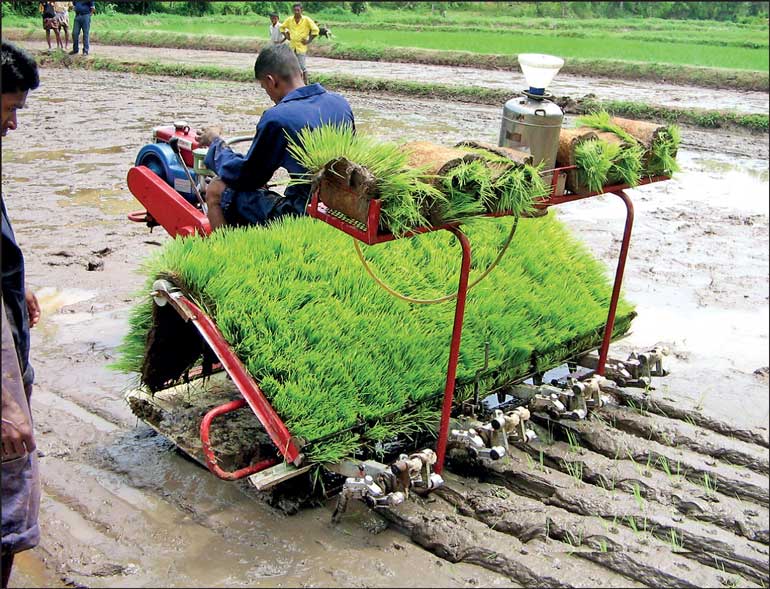Monday Feb 23, 2026
Monday Feb 23, 2026
Friday, 1 March 2024 00:06 - - {{hitsCtrl.values.hits}}

There are a number of reasons to still be optimistic about the future
of Sri Lanka’s agricultural sector
 Sri Lanka, despite being a nation with a rich history once known to be self-sufficient as the Pearl of the Indian Ocean and a strategically located trading hub on the maritime Silk Route fostering a vibrant culture, has long grappled with achieving consistent and sustainable economic independence, especially since after the worst economic crisis the country ever faced recently in 2022. One of the key areas where this struggle is most evident is in agriculture which has been the backbone of the island nation’s economy for centuries, still employing nearly a third of the population, especially made up by daily wage-earning rural communities, particularly women, and contributes substantially to Sri Lanka’s GDP as well as food security.
Sri Lanka, despite being a nation with a rich history once known to be self-sufficient as the Pearl of the Indian Ocean and a strategically located trading hub on the maritime Silk Route fostering a vibrant culture, has long grappled with achieving consistent and sustainable economic independence, especially since after the worst economic crisis the country ever faced recently in 2022. One of the key areas where this struggle is most evident is in agriculture which has been the backbone of the island nation’s economy for centuries, still employing nearly a third of the population, especially made up by daily wage-earning rural communities, particularly women, and contributes substantially to Sri Lanka’s GDP as well as food security.
In recent years, there has been a growing recognition of the need to diversify Sri Lanka’s economy and reduce its heavy dependence on tea, rubber and coconut exports which left Sri Lanka vulnerable to fluctuations in global commodity prices with a decline in income generated in 2023. Though the Government did attempt to launch a number of programs aiming at promoting the production and export of higher-value agricultural products, such as fruits, vegetables, and spices, apart from the lack of continuation of these initiatives, there are still on-going number of challenges that need to be addressed.
One of the pressing concerns is the lack of infrastructure and investment in the agricultural sector. Many farmers still have no proper access to irrigation, storage facilities, and transportation networks, which makes it nearly impossible for them to get a marketable product to the global market. Additionally, the Government has been criticised for not providing enough support to small scale local farmers in the form of subsidies, loans, and technical assistance resulting in the failure to organise the farmers to adhere to quality benchmarks. Limited access to finance and technology hinders modernisation and productivity growth, keeping Sri Lanka from fully harnessing its agricultural potential.
While challenges like meeting international quality standards and navigating complex trade regulations somewhat already restrict industry stakeholders access to high-value markets, the frequent changes in agricultural policies and regulations create further uncertainty with discouragement among the present generations forcing them to leave the industry, adding more inflationary pressure with higher prices for local consumers, and increasing dependence on imports due to food insecurity.
On the other hand, the heavy reliance on imported agricultural inputs including high cost of organic fertilisers with lack the knowledge and resources to transition effectively and the increasing fuel prices impacting the transportation costs has a direct impact on the high cost of production for agri-based products in Sri Lanka. The limited access to agricultural mechanisation leads to reliance on manual labour, which is another expensive affair also resulting in inefficiency to meet globally demanded volumes apart from the domination of the middleman in the agricultural value chain adding high margins leaving no room for price sensitivity. As a result, unfortunately, Sri Lankan agricultural products are often priced out of the competitive international market, losing to Thailand, Indonesia and Vietnam.
Having said these, there are a number of reasons to still be optimistic about the future of Sri Lanka’s agricultural sector. By addressing these challenges, Sri Lanka can create a more resilient and sustainable agricultural sector that will immensely contribute to the country’s long-term economic growth while also uplifting the quality of life of the rural village farmers and surrounding communities to be part of a global village. To begin with, Sri Lanka has favourable climatic conditions and fertile land which give a comparative advantage with great potential to again become a self-sufficient agricultural powerhouse. Further, the burgeoning international appetite for vegan, organic and sustainable produce opens new doors for Sri Lankan farmers to capitalise on premium markets which were not tapped previously.
In order to achieve agricultural-driven economic independence, Sri Lanka needs to move beyond the trading mentality of raw exports, diversifying exports with the island’s rich tapestry of agri-resources, mitigating dependence on single crops which will also create the ability to cater to varied global demands. By shifting the focus towards high-value niche markets such as organic produce, medicinal herbs, and specialty spices products, and processing raw produces into finished goods, such as canned fruits and vegetables, and by developing new products such as ready to eat vegan and other healthy food alternatives, Sri Lanka can significantly boost export earnings and create higher-paying job opportunities in the local industry. Imagine shelves stocked with Sri Lankan coconut-based wellness products or vibrantly branded spice blends – the possibilities are endless with the blooming prospects.
To navigate this complex maze, Sri Lanka clearly needs a strategic roadmap. This calls the government to invest in infrastructure development and innovation. Prioritising research and development of climate-resilient crops and sustainable farming practices with drought-resistant varieties and water-efficient irrigation systems are crucial for long-term success. The currently existing knowledge gap in the industry needs to also be addressed empowering farmers and encouraging agri-entrepreneurship, providing the right training and resources to embrace modern technologies and techniques such as seed farming. Digital literacy and access to market information are key tools for navigating the ever-evolving agricultural landscape, also creating a supportive environment for small businesses looking forward to thriving in the global market.
Ensuring fair trade practices throughout the supply chain, guaranteeing farmers receive a just share of the profits will not only fosters economic justice but also incentivises sustainable practices and motivates future generations to stay rooted in agriculture.
Fostering strong collaborations between Government, private sector, and research institutions is also important to enhance infrastructure, market access, and export capabilities with the improvement of the trade policies with the careful analysis of the increasing global trends towards resilient equitable food systems. A collective effort is essential to overcome individual limitations and propel the local agriculture sector forward. Encouraging the formation of cooperatives play a crucial and multifaceted role in the agricultural business, offering numerous benefits enabling farmers to thrive, supporting sustainable agricultural practices, and strengthening the agricultural sector as a whole while also contributing in the long run towards rural development and community building.
Going a step further, by encouraging local investments in innovative industries such as renewable energy and technology can further reduce the dependence of imports reducing the cost of agri-based productions while also creating a strong and diversified economy.
The quest for economic independence through agriculture is a marathon, not a sprint. While challenges abound, Sri Lanka’s diverse potential, growing global demand for sustainable products, and a spirit of innovation offer fertile ground for hope. By navigating the maze of agricultural exports strategically fostering innovation, technological advancements, and inclusive policies, Sri Lanka can transform its agricultural sector into a powerful engine of economic growth and self-reliance, securing a brighter and more prosperous future for its people and communities with sustainable food security.
(The writer has over 17 years of experience in international marketing in Europe and Asia and is currently engaged in the Sri Lankan agri-exports industry.)